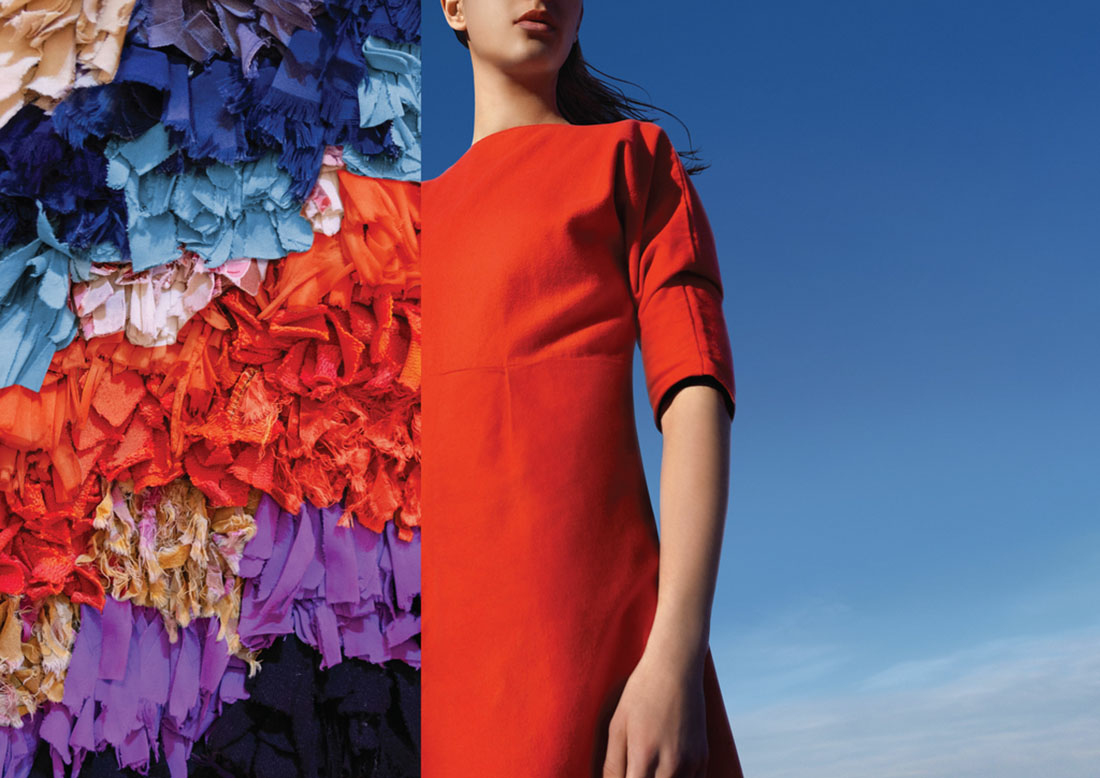The fashion industry is only as good as the materials used to design appealing garments, and the consumer’s appetite for conscious and responsible options is a fast-growing characteristic that designers must address. A McKinsey & Company survey on fashion sustainability seekers shows that “one-quarter of respondents to our survey indicated that they are concerned about sustainability-related issues,” with 56% of them identifying as female, and 58% of them under 35 years of age. They note that this trend will grow quickly as Millennials and Gen-Zers age and increase their income. Lenzing’s latest LENZING™ ECOVERO™ with REFIBRA™ technology offers a solution.
To address the enormous textile waste challenges facing the fashion industry, Lenzing developed its REFIBRA™ technology, a recycling process for cotton textile waste. The company has now expanded its resource-efficient REFIBRA™ technology to LENZING™ ECOVERO™ branded viscose fibers. Available worldwide, LENZING™ ECOVERO™ with REFIBRA™ technology incorporates up to 20% of recycled raw material content from post-consumer textile waste. The goal is to further increase this ratio in the future. This aligns with the needs of mills, manufacturers, and brands seeking to meet evolving industry requirements and consumer preferences as demand for planet-conscious materials and responsible production practices continues to rise.
Behind REFIBRA™ Technology, Lenzing’s Innovation Towards a Circular Textile Economy
Launched in 2017, Lenzing’s REFIBRA™ technology entails the upcycling of cotton textile scraps generated during garment manufacturing, converting them into cotton pulp. Up to one-third of this is integrated with wood pulp, and the combined material is transformed to yield new virgin TENCEL™ Lyocell fibers to make fabrics and garments. The successful introduction of TENCEL™ Lyocell fibers with REFIBRA™ technology on a commercial scale, however, was only one of Lenzing’s key steps in accelerating circularity.
LENZING™ ECOVERO™: Responsible[1] Viscose Fibers with the Planet in Mind
Each garment starts with its “ingredient,” the material used for its production. Viscose, one of the most popular materials for the textile industry, is a staple ingredient for fashion – thus, the search for a clean viscose is of paramount importance for an industry grappling with tolling environmental impact.
With more than 500 brands on board in 2022 alone, choosing LENZING™ ECOVERO™ as a fiber partner, its benefits are clear and proven – including responsible production that contributes to less resource usage and emissions[2], increased credibility of sustainability, more assurance in supply chain integrity, as well as versatile options in quality, range, and fashion applications. The latest expansion of REFIBRA™ technology to LENZING™ ECOVERO™ only further solidifies Lenzing’s commitment to offering innovative and improved fiber solutions that boost textile circularity.
“LENZING™ ECOVERO™ with REFIBRA™ technology is well-positioned to meet the surging demand for diverse circular design innovations,” said Florian Heubrandner, Executive Vice President Global Textiles Business at Lenzing in a press release. “This new offering empowers like-minded fabric mills, garment manufacturers, and consumer brands to embark on this transformative journey alongside Lenzing – breathing new life into post-consumer textile waste while anchoring circularity at the core of the textile value chain.”
Meets Growing Viscose Demands in Asia-Pacific
With the Asia-Pacific region being among the largest apparel markets in the world, Lenzing has dedicated resources to strategically serve this marketplace that boasts a high degree of need for quality and responsible viscose. In fact, along with reaching the production milestone of over 300,000 tons of LENZING™ ECOVERO™ in its Austria and China plants, Lenzing has also increased production capacity in the Purwakarta plant, which is quickly becoming a major supplier to that region.
Continuing with its mission to increase textile circularity, Lenzing’s commitment to the LENZING™ ECOVERO™ brand creates a positive synergy with its other lines, such as the popular TENCEL™ Lyocell fibers with REFIBRA™ and expands the company’s dedication to continuing to improve the overall circularity of its offerings. It is a go-to choice for textile manufacturers and fashion brands that seek to meet growing industry and consumer demand by incorporating responsible materials and production practices.
Read more about Lenzing’s Other Sustainability Efforts.
[1] Produced with up to 50% lower water impact and carbon emissions compared to generic viscose, LENZING™ ECOVERO™ branded viscose fibers are certified with the EU Ecolabel, which is recognized in all member states of the European Union, as well as Norway, Liechtenstein and Iceland. The voluntary label, introduced by an EU regulation in 1992 (Regulation EEC 880/92), has gradually become a reference point for consumers who want to help reduce pollution by purchasing more environmentally friendly products and services
[2] As compared with generic viscose according to Higg MSI, the production of LENZING™ ECOVERO™ has a reduced environmental footprint.


